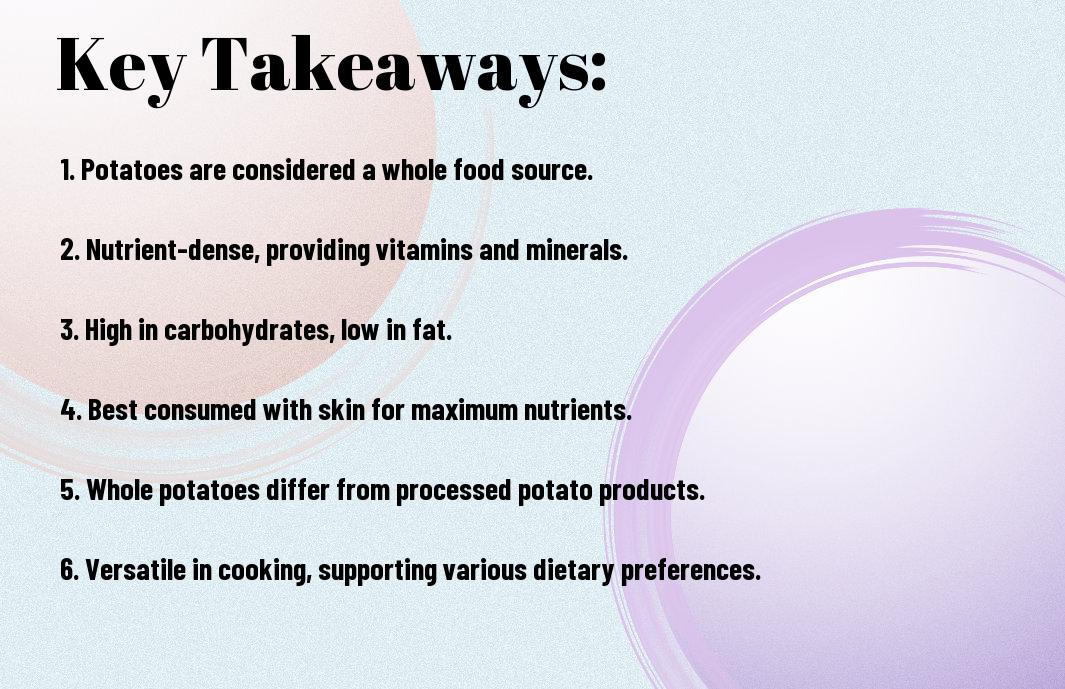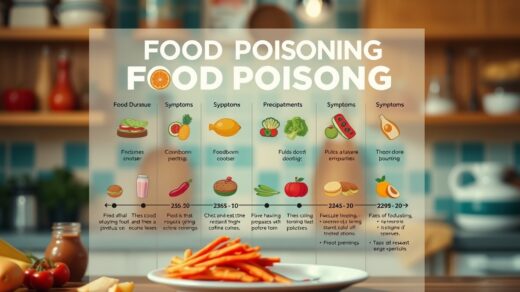Fiber is an imperative component of a healthy diet, and you might wonder if potatoes fit into this category as a whole food. In this blog post, we will explore the nutritional profile of potatoes, their benefits, and how they can be incorporated into your meals. You’ll learn why many people consider them a wholesome option, and if you’re following specific dietary guidelines, like the Whole30 program, discover how Potatoes Are Now Whole30-Approved (and Here’s Why). Understanding these aspects can help you make informed choices about the foods you consume.

Key Takeaways:
- Whole Food Classification: A potato is considered a whole food as it is a natural, unprocessed food that contains all its original parts.
- Nutritional Value: Potatoes are packed with necessary nutrients, including vitamins, minerals, and fiber, making them a healthy addition to a balanced diet.
- Culinary Versatility: Potatoes can be prepared in various ways, further highlighting their status as a whole food that can fit into different meals and cuisines.
Understanding Whole Foods
Definition of Whole Foods
On a fundamental level, whole foods are foods that are minimally processed and free from artificial ingredients. They are natural, nutrient-dense foods that retain their original form, such as fruits, vegetables, grains, nuts, and seeds. You should aim to incorporate these foods into your diet as they offer numerous health benefits compared to processed alternatives.
Health Benefits of Whole Foods
One of the key advantages of whole foods is that they are packed with important nutrients, fibers, and antioxidants that support overall health. By choosing whole foods, you empower your body with the vitamins and minerals it needs to function optimally and combat chronic diseases. You might find that incorporating these foods leads to improved digestion, better weight management, and enhanced energy levels.
Whole foods are beneficial because they provide your body with an array of nutrients without the added sugars, unhealthy fats, and preservatives commonly found in processed foods. This means better heart health, stable blood sugar levels, and a lower risk of obesity. Emphasizing whole foods in your diet supports your long-term well-being and helps you make healthier eating choices.
Examples of Whole Foods
Definition of whole foods includes an array of options such as fresh fruits, vegetables, whole grains, nuts, seeds, and legumes. You can also include minimally processed dairy and animal products like eggs and unprocessed meats. Incorporating these into your meals will help you maximize the benefits and flavor of your diet.
It is important to remember that whole foods come in many forms. Think of incorporating a variety of foods like leafy greens, berries, quinoa, and avocados into your daily meals. By diversifying your choices, you ensure a balanced intake of nutrients and enjoy a wide range of flavors and textures on your plate.
Nutritional Profile of Potatoes
There’s no denying that potatoes are a popular staple food around the world. Understanding their nutritional profile can help you make more informed dietary choices. Potatoes provide a range of macronutrients and micronutrients, which can be beneficial when included as part of a balanced diet.
Macronutrients in Potatoes
Profile of potatoes reveals that they are primarily composed of carbohydrates, making them a significant energy source. A medium-sized potato contains about 30 grams of carbohydrates, 2 grams of protein, and less than 1 gram of fat. This unique macronutrient composition makes them ideal for fueling your daily activities.
Micronutrients in Potatoes
Nutritional value extends beyond macronutrients; potatoes are also rich in vital micronutrients. They are a good source of vitamins C and B6, potassium, and magnesium, which are vital for various bodily functions. Including potatoes in your diet can contribute to improved nutrient intake.
This variety of micronutrients found in potatoes supports immune function, aids in energy metabolism, and helps regulate blood pressure. Incorporating potatoes into balanced meals can enhance your overall nutrient profile, ensuring you receive key vitamins and minerals vital for health.
Glycemic Index of Potatoes
Any discussion about potatoes should include their glycemic index (GI), which measures how quickly a carbohydrate-containing food raises your blood glucose levels. Potatoes typically have a medium to high GI, depending on the variety and cooking method.
Index indicates that foods with a high GI can cause rapid spikes in blood sugar, which may not be ideal for everyone. However, combining potatoes with healthy fats or proteins can slow down absorption, making their glycemic response more gradual. Being mindful of portion sizes and preparation methods can help you enjoy potatoes as part of a balanced diet.
Potatoes in the Diet
Keep in mind that potatoes can be a versatile and nutritious component of your diet, offering necessary vitamins and minerals. They are rich in vitamin C, vitamin B6, potassium, and fiber, allowing you to incorporate them into meals that support overall health while satisfying your palate.
Role of Potatoes in Nutrition
An important aspect of potatoes is their carbohydrate content, which provides a great source of energy. In addition to carbs, they contain antioxidants that can help protect your cells from damage and promote well-being. This combination makes potatoes a valuable addition to a balanced diet.
Cooking Methods and Their Impact on Health
Potatoes can be prepared in various ways, each affecting their nutritional profile and overall health benefits. From baking to frying, the healthfulness of your potato dishes can significantly change depending on how you cook them.
With cooking methods like boiling or steaming, you can preserve the most nutrients while keeping calories lower. Conversely, frying can add unhealthy fats and excess calories, potentially negating many of the health benefits potatoes offer. Being mindful of how you prepare your potatoes can help you maximize their health potential.
Potatoes vs. Other Carbohydrate Sources
The comparison between potatoes and other carbohydrate sources is key to understanding their value in your diet. While whole grains and legumes also provide beneficial nutrients, potatoes offer unique advantages in terms of their ease of preparation and satisfying texture.
The versatility of potatoes allows you to include them in a wide range of dishes, making them a convenient choice when balancing your carbohydrate intake. They can replace or complement other sources, such as rice or pasta, while still delivering vitamins and minerals your body needs for optimal health.

Conclusion
From above, you can see that a potato is considered a whole food, as it is minimally processed and contains a variety of necessary nutrients. Eating potatoes in their whole form allows you to benefit from their fiber, vitamins, and minerals without the additives found in more processed foods. By incorporating whole potatoes into your diet, you can enjoy a versatile and nutritious food that supports your overall health and well-being.
FAQ
Q: Is a potato considered a whole food?
A: Yes, a potato is considered a whole food. Whole foods are generally defined as foods that are minimally processed and are not significantly altered from their natural state. Potatoes, when consumed whole and not processed into forms like chips or fries, retain their nutritional value and are classified as whole foods due to their natural form and nutrient density.
Q: What nutritional benefits do whole potatoes offer?
A: Whole potatoes are rich in necessary nutrients such as vitamins C and B6, potassium, and dietary fiber. They also provide antioxidants and various phytonutrients. Eating potatoes in their whole form can contribute to a balanced diet and support digestive health due to their fiber content.
Q: Are sweet potatoes and regular potatoes both considered whole foods?
A: Yes, both sweet potatoes and regular potatoes are considered whole foods. They are both unprocessed and provide a range of nutrients. While they differ slightly in their flavor profiles and nutrient content, both types of potatoes can be included in a healthy diet as whole foods when prepared without excessive processing.
Q: Can potatoes be part of a healthy diet if they are high in carbohydrates?
A: Yes, potatoes can be part of a healthy diet even though they are high in carbohydrates. The carbohydrates found in potatoes are complex carbs, which provide energy and fiber. When eaten in moderation and as part of a balanced diet, whole potatoes can contribute positively to overall health. It’s important to consider how they are prepared and served, opting for methods like baking or boiling over frying.
Q: How should I prepare potatoes to maintain their whole food benefits?
A: To maintain the whole food benefits of potatoes, it is best to avoid high-fat cooking methods like frying. Instead, opt for healthier preparation methods such as baking, steaming, or boiling. Keeping the skins on can also enhance their fiber content and nutrient retention. Additionally, avoid adding excessive salt or rich sauces to keep them a healthy whole food option.


